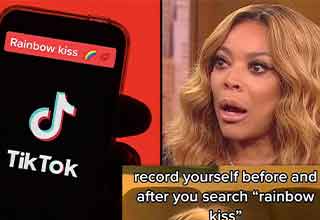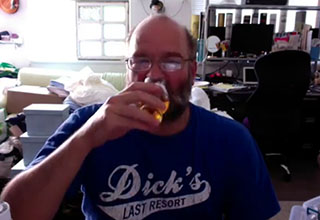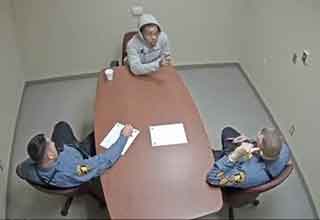
For a few short hours on Thursday night, the “Planet of the Bass” was located at a bar in Brooklyn, New York.
Fresh off of his rise to internet fame as his alter ego, DJ Crazy Times, musical comedian Kyle Gordon headed to Bushwick hotspot Mood Ring to unveil the full version of “Planet of the Bass,” his mega-viral Eurodance parody boasting millions of views on TikTok and Twitter.
As the clock struck midnight, Gordon, wholly engrossed in his maroon-haired vaguely-Slavic persona, made his way through the red smokey dance floor, weaving through a shockingly-packed crowd of mostly zoomers in already sweat-soaked Y2K getups. They, just like him, were here for one reason — an at least somewhat unironic appreciation for Eurodance, the high-energy, bass-thumping genre that set Europe and some of the United States ablaze in the ‘90s.
“Put your hands in the air right now!” he yelled, the mic stationed in his still power-posing hand, a demand that served as an apt intro for a set best described as a TikTok clip ripped from our 6.7-inch phone screens and dropped into the real world.
Gordon’s 10-minute, fist-pump-fueled, headlining performance was a revisionist late ‘90s fever dream. Consisting of Aqua’s “Roses Are Red,” E-Rotic’s “Sex On the Phone,” and of course, the full version of his viral banger … well, at least the TikTok famous verses he actually bothered to sing, it seemed he was in on the joke, though some of the video’s initial charm may have gotten lost in translation as it burst from a collection of pixels and into a crowded nightclub.
“Go inside of the computer tonight!,” he yelled to the crowd in his character’s vaguely Eastern European accent, one of the many nonsensical sweet nothings peppered throughout his act.
“Sarajevo! Bucharest! Bratislava!” he continued, eliciting a handful of confused cheers. “Let me see your beautiful faces!”
Just as in “Planet of the Bass’” latest controversial music video, DJ Crazy Time’s duet partner, TikToker Audrey Trullinger’s Ms. Biljana Electronica, was conspicuously missing from the high-profile event. This absence felt particularly palpable during the large, silent swathes of his solo set, of the many ways Gordon’s live show diverged from its source material.
“I’ve seen it all over, I think that my worry is that the full song will not capture the vibe that the TikTok had,” Mica, a Brooklyn-based DJ, had predicted earlier in the evening, noting that they had only learned about the event upon arriving at the “legendary bisexual club.”
“There was something really nice and very like, just, ephemeral about just seeing a random TikTok video that’s just a really nice joke that you get, especially with the high production quality that the video has” they continued. “How does the TikTok joke translate to a full song, let alone a full song at Mood Ring?”
The answer? It doesn’t. It’s a different beast unto its own, one that largely divided the show’s suddenly-unironic patrons.
“It absolutely lived up to it and exceeded it,” Evan, an attorney who had only heard “Planet of the Bass” for the first time earlier that day, said of how the performance compared to his expectations. Though he noted that the TikTok and its full-length live counterpart had several differences, they both had equally endearing strong suits.
only the most beautiful beautiful beautiful of girlies have a blurry 8 minute iphone video featuring the exclusive live recording of the FULL version of DJ Crazy Time’s (ft. Ms. Biljana Electrónica) song of the summer ‘Planet of the Bass’ pic.twitter.com/zS4MMeEkuf
— noferatu fan psge (@hiheloplsgoaway) August 4, 2023
Where the viral clip boasted “a lot more crazy visuals” and complex choreography, an effort aided by the notably MIA Ms. Biljana Electronica, the audience’s excitement made up for those gaps.
“It was a really massive crowd who were all sharing this beautiful experience together,” he recalled. “I wanna see more of it.”
Yet Michael, an architect who stumbled across the event during a night out, was less than impressed with Gordon’s live show.
“It felt more appropriate as a TikTok, I’ll say it,” they admitted. While Michael cited the song’s production value, Gordon’s high-energy performance, and the crowd’s enthusiasm as high points of the set, they felt the act fell short when it came to curating the space.
These Barbies are from The Planet of The Bass ️ pic.twitter.com/zeVWH1xuYn
— Smarty-Prance (@ARealTrashAct) August 3, 2023
“As a TikTok, it’s supposed to be entertainment, it’s supposed to be the thing that you’re looking at, it was good, but it wasn’t building an environment,” they said, noting that as “viral content is meant to be something that engulfs you in the moment,” live performances largely hinge on working with a space.
“I came here for my friends but I still feel this uncanny pull towards this person who has some teeny tiny bit of fame,” said Ryan, a grad student who regularly attended the venue’s ongoing hulaHOOP Eurodance party series.
on the PLANET of the BASS ‼️‼️ pic.twitter.com/T5JXtZJz9r
— ☆☆ ! (@wootiep) August 4, 2023
“People want to see it happen, or be close to it,” he continued, describing his proximity to Gordon’s viral fame as “intoxicating. “I think people can’t resist the opportunity to be a part of some kind of infamy.”
But whether the character of DJ Crazy Times lived up to his name — and the fanfare surrounding his song — didn’t actually matter. The event's largest draw arguably wasn’t nabbing the chance to hear the full track before its August 15 release, but rather feeding an existential hunger that has come to define the internet era — standing at the forefront of a cultural moment.











1 Comments